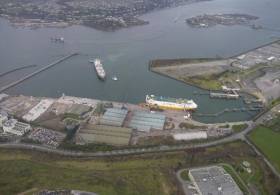Displaying items by tag: Instrument for Open Investment
EU Ports Welcome Foreign Investment Screening As Instrument for Open Investment Environment
#Ports&Shipping - The European Commission published a Proposal for a Regulation last September, establishing a framework for screening of foreign direct investments into the EU and a Communication entitled “Welcoming foreign direct Investment while Protecting Essential Interests”.
The European Sea Ports Organisation (ESPO) welcomes the fact that the Commission proposal is stressing the importance of an open investment environment. The port sector is capital intensive. Over the last decades ports in Europe have benefitted from substantial investment from outside the European Union, both directly into assets and in some cases, into significant equity stakes in port owners. The ports sector recognises the important role these investments have played in the development and success of European ports. ESPO therefore believes that having an open investment environment should remain one of the basic principles of Europe’s Trade policy.
European ports are essential nodes in the transport chain and important gateways to the world. But many ports are also strategic nodes for energy generation, trade, storage and distribution, increasingly important clusters of industry and blue economy and - in many areas of Europe - essential for the mobility of people. In this role, ports may also pursue objectives of general interest in close cooperation with local communities such as safety as well as ambitious air quality and decarbonisation policies. European ports are in many ways strategic assets. Investments into essential and/or critical European port infrastructure of general interest, which enable effective participation in the management or control of a company, should be assessed from that perspective.
European ports have been designated as “critical infrastructure” according to the Critical Infrastructure Directive (2008/114/EC). Overall, European ports play an indispensable role in the supply of goods and the logistic chain. Because of the geo-political situation and given their location, some European ports are or can become at some point an essential part of an emergency supply chain, in view of ensuring the connectivity of the region with the main markets, as well as function as important strategic points for military operations. Where this is the case, these ports should be considered as such in the context of European transport and port policy.
ESPO welcomes the current Commission proposal insofar that it provides a basic framework for existing screening mechanisms in the European Union, without imposing any Member State to develop such a framework. It can give guidance to those Member States that currently do not have such a framework, avoiding ad hoc political decisions on whether a third country investment can take place or not. It also follows the logic of existing screening policies in countries which are important trading partners of the EU (US, Canada, Australia, China, Russia and Japan). It must, however, be implemented in a way that does not jeopardise either through action or perception the ongoing inward investment that has benefitted the European Ports sector. Any initiative should also take into account the diversity in governance and ownership of European ports.
ESPO believes that more transparency among Member States on important foreign direct investments can help the Member States in their decision making. The information received in application of the Regulation should be used only for that purpose. It is essential that the Commission and Member States ensure full confidentiality in that respect.
ESPO believes that proportionality and consistency should be paramount in the implementation of any screening mechanism to ensure that Europe remains an attractive place to invest in ports and that those signals are clear to investors. Screening processes should be clear and objective. Screening criteria and thresholds should be clear and targeted specifically at identified causes of concern.
ESPO understands the wish of the Commission to screen foreign direct investments likely to affect projects of Union interests and relating to projects which involve a substantial amount or an important share of EU funding (such as EU funded TEN-T infrastructure). The Commission should respect the same framework as the Member States and demonstrate full transparency in its screening policy.
ESPO believes that any investment into essential and critical port infrastructure should be made in full respect of EU competition and state aid rules. Foreign companies should be subject to the EU legal framework and assessed in the same way as European companies. Particular attention should be given in that respect to the market investor principle.
EU competition policy should have the tools to assess foreign investments and undertakings in the same sector against the level playing pitch in the shipping and port sector and have a proper assessment of the dominant market position in that respect.
Finally, ESPO believes that the principle of reciprocity and non-discriminatory access for EU companies to foreign port sectors should be the cornerstone of any decision on foreign direct investments.






























































